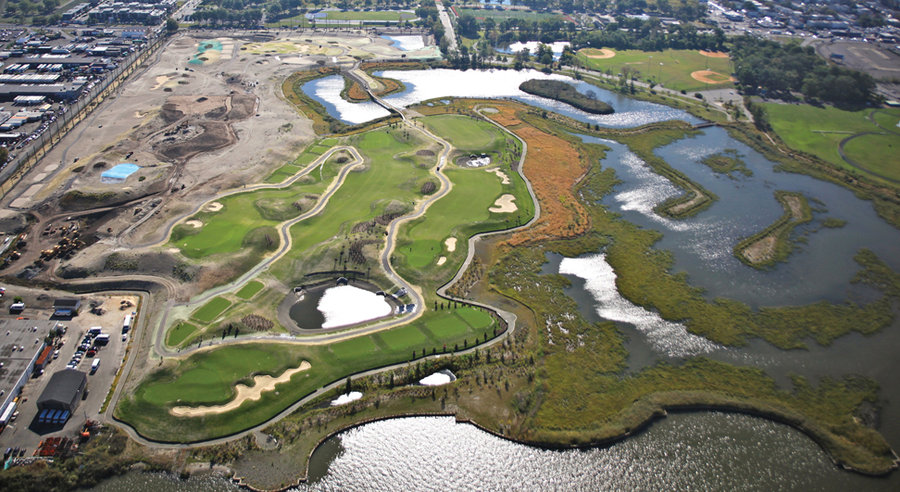A federal investigation begun more than three years ago has led to the arrest of two Jersey Shore men in connection with what authorities say was an alleged scheme to extort payments from suppliers of landfill destined for the delayed Hudson County Public Golf Course in Jersey City.
U.S. Attorney Paul J. Fishman said two people involved in the project have been charged with extortion, and other indictments may be forthcoming.
Gerard Pica, 65, of Middletown, and James Castaldo, 59, of Beachwood, were indicted by a federal grand jury on Feb. 10, and each charged with two counts of conspiracy to commit extortion and accepting and agreeing to accept corrupt payments.
“All the charges are related to Gerard Pica’s [former] employment at the Hudson County Improvement Authority (HCIA),” Fishman said.
Paul Swibinski, spokesperson for the HCIA, said, “The HCIA cooperated fully with federal authorities from the start and will continue to do so. No current HCIA employees have been charged in this.”
He noted, “This has nothing to do with the quality of soil that went into the golf course.”
According to Hudson County officials, Pica resigned from his job about a year ago. But federal authorities are claiming he used his position to influence another unnamed county employee.
The HCIA, overseeing the golf course project, offset its construction costs by accepting payments from various suppliers of landfill who needed to unload the materials. The indictments allege that Pica and Castaldo acted as middlemen in the transaction and demanded payments from certain suppliers after promising that the HCIA would accept payment for the landfill from them and not other suppliers.
The HCIA and its projects
The HCIA is an autonomous agency with a variety of roles. It acts as a kind of bank for municipalities, lending money for capital improvement projects or backing other loans. It oversees countywide recycling, transportation, affordable housing, and other services. It has used its bonding power to help fund large projects such as parking facilities for the Red Bull Stadium in Harrison. Loans from the HCIA have helped various municipalities deal with budget shortfalls, for instance, when the HCIA paid to acquire public buildings in Union City and Bayonne over the last decade.
According to the documents filed in this case and statements made in court, the HCIA was overseeing the construction of a nine-hole public golf course located at Lincoln Park West in Jersey City.
As part of its construction, the project required several hundred thousand cubic yards of soil, fill material and crushed stone to be incorporated into the site and to serve as road bedding during the construction of the golf course. As the overseer of the project, one of the functions of the HCIA – either directly or through a designated contractor – was to serve as a gatekeeper for any material to be delivered to the site.
It was the HCIA’s responsibility to solicit, evaluate, and decide which contractors’ proposals to accept to provide soil and fill material for the project. From at least August 2010 to November 2011, the indictment says, Pica and Castaldo and others allegedly schemed to obtain payments from certain contractors in exchange for Pica and another individual using their influence with the HCIA over who to do business with.
The indictment said Pica allegedly used his influence on a county employee (listed as Employee 1) who had “authority and discretion over matters involving the selection of, and the administration of the conduct of, contractors seeking to deliver soil and fill material to the LPW project site.”
The indictment claims that Pica was allegedly able – through Employee 1 – to “influence the HCIA’s decisions regarding the selection of contractors to provide soil and fill material to the LPW project.”
Freeholders suspected something years ago
Freeholder Bill O’Dea said he was not surprised at the arrests, saying the freeholder board had raised concerns about the project at the time of the FBI raids. In a series of raids, federal authorities had seized computers from the HCIA in early 2012 at what appeared to be the beginning of the investigation.
At the time, the freeholders were concerned about delays in the construction of the golf course, located in Lincoln Park West on approximately 60 acres of underutilized land. Started in 2010, the project was originally slated to take 18 to 24 months to complete. The project was largely finished in late 2014.
HCIA officials at the time said the delays were the result of several factors, including waiting for two other projects to be completed, and the coming of Hurricane Sandy. But O’Dea at the time questioned whether the delay was designed to help a middleman for one of the landfill suppliers involved make a profit from the fill being sold to the agency.
The HCIA granted three deadline extensions to the contractor pay them to accept the fill dirt. The contractor won the original bid based on the county requirement that the fill be provided within a nine-month period, but extensions granted the firm have stretched to more than twice that time.
O’Dea said his own investigation of documents showed that the firm that was awarded the opportunity to pay the HCIA to take the fill off its hands got more time to do the work than was outlined in the original bid specifications. He said that because the HCIA was making money by accepting the fill, this may have been a contributing factor that delayed the golf-course project.
“The arrests last week may explain some of the delay,” O’Dea said.
Al Sullivan may be reached at asullivan@hudsonreporter.com.
